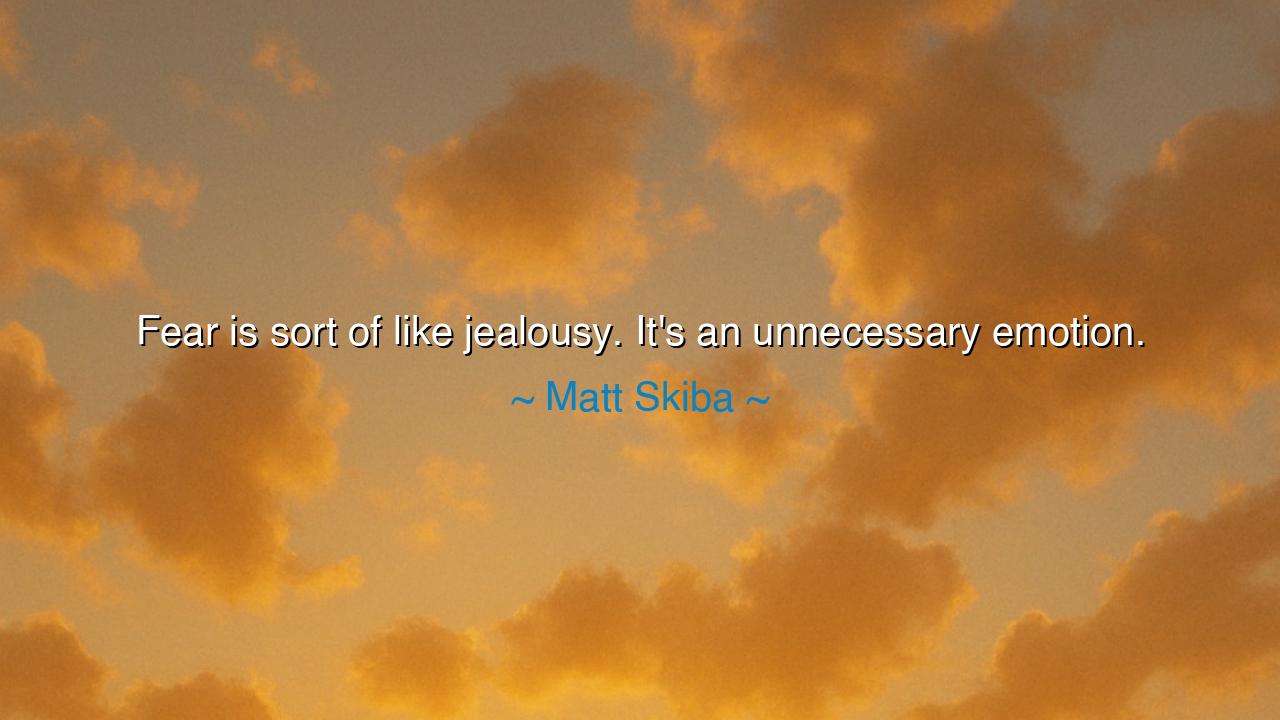
Fear is sort of like jealousy. It's an unnecessary emotion.






In the sharp and reflective words of Matt Skiba, “Fear is sort of like jealousy. It’s an unnecessary emotion.” These words, though simple in tone, strike at the very heart of human frailty. For fear and jealousy — twin specters that dwell within every soul — have ruled mankind since its dawn, yet neither creates, neither uplifts, neither enlightens. Both are born from the same root: the illusion of lack — the belief that we are incomplete, that the world is hostile, that others possess what we do not. Skiba’s insight is not a denial of human feeling, but a call to transcend it. He speaks as one who has glimpsed a higher truth — that courage and love are the only emotions worthy of shaping one’s destiny.
The origin of this quote arises from Skiba’s reflections as both an artist and a thinker. As a musician, he walked the paths of creativity, where vulnerability meets judgment and where fear can easily silence the voice of truth. To him, both jealousy and fear are distractions from purpose — emotions that imprison the heart and obscure the light of authenticity. In likening fear to jealousy, he reveals their shared nature: each is a whisper of comparison, a shadow cast by doubt. Both tell us that what we have is not enough, that who we are cannot stand alone. But to the wise, such whispers are illusions — mirages that fade when one dares to walk forward with faith.
In ancient wisdom, too, these emotions were seen as enemies of the soul. The Stoic philosophers, men of stillness and reason, taught that fear is a lie told by the imagination — an echo of the future that has not yet come. Seneca wrote, “We suffer more in imagination than in reality.” Fear creates storms before the sky even clouds, just as jealousy breeds enemies where none exist. Both turn the mind inward upon itself, corroding its peace. The ancients knew that a man’s spirit cannot rise when it is chained to such phantoms. They taught that the path to greatness begins not with conquest of others, but with the conquest of emotion — the silencing of what is unnecessary, so that what is eternal might speak.
Consider, then, the story of Nelson Mandela, who spent twenty-seven years in prison under a merciless regime. He had every reason to bow before fear and surrender to jealousy of those free beyond the walls. Yet he chose otherwise. When asked later how he endured, he said that he learned that courage was not the absence of fear, but the triumph over it. He did not let fear guide his heart; he did not let resentment darken his soul. By shedding these unnecessary emotions, Mandela became a man not ruled by circumstance, but by vision. And through that vision, he led a nation out of darkness. His life is proof that fear, though loud, is never indispensable — that even the most oppressive chains cannot hold a spirit that refuses to be afraid.
To call fear “unnecessary” is not to deny its existence — it is to see through its disguise. For fear often wears the mask of protection, pretending to keep us safe, when in truth it only keeps us small. Like jealousy, it feeds on insecurity, convincing us that we must defend what we are rather than expand what we can become. But greatness is not born in safety; it is born in risk, in the leap across uncertainty. Every hero who has ever walked the earth — from explorers who sailed into unknown seas to thinkers who challenged the boundaries of belief — has had to face this truth. They learned that fear cannot be reasoned with, only released; that jealousy cannot be satisfied, only transformed into admiration and self-mastery.
Even in the smallest moments of life, this wisdom applies. The student afraid to fail, the lover afraid to lose, the artist afraid to begin — all are haunted by the same phantom. And yet, once they act despite it, the illusion dissolves. For action is the enemy of fear, and gratitude is the cure for jealousy. When we give ourselves fully to the present, when we celebrate the gifts we already hold, fear and envy lose their ground. They cannot coexist with awareness. They are unnecessary, because they vanish the moment truth enters.
The lesson, then, is this: do not waste the light of your spirit on fear or jealousy. They are emotions of scarcity, unworthy of your boundless soul. When fear speaks, listen — but do not obey. When jealousy arises, let it remind you not of what you lack, but of what you desire to become. Transform envy into inspiration, and fear into motion. Remember that every step taken in courage expands the world, while every step taken in fear diminishes it.
So let the words of Matt Skiba stand as both challenge and counsel: “Fear is sort of like jealousy. It’s an unnecessary emotion.” The ancients would have agreed, for they knew that only through stillness of heart can wisdom be born. Cast off these needless shadows, for life is too brief to live in hesitation or envy. Stand fearless, love deeply, and walk your path with unshakable faith. For the one who conquers fear and jealousy does not merely survive — they awaken to their truest, most radiant self.






AAdministratorAdministrator
Welcome, honored guests. Please leave a comment, we will respond soon